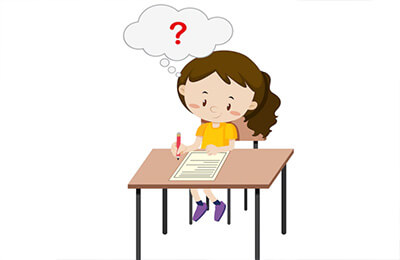“反意疑问句”析与练
时间:2022-06-16 02:45:03

反意疑问句,又称附加疑问句,是在陈述句后边加上一个简短问句,对陈述句所叙述的内容提出相反的疑问。反意疑问句可以表示真实的疑问,也可以表示提问人的倾向、强调或反问。如果陈述句是肯定句,后边的反意疑问句通常要用否定式;反之,如果陈述句是否定句,后边的反意疑问句通常要用肯定式。陈述句和后边的反意疑问句的主语以及谓语动词的人称、数、时态通常要保持一致。例如:
1. You are a student, aren’t you?你是个学生,不是吗?
2. We didn’t see Tom,did we?我们没见到汤姆,是吗?
一、反意疑问句的回答
反意疑问句一般根据实际情况回答,肯定回答用“Yes,+肯定结构”;否定回答用“No,+否定结构”。
1.当陈述部分为肯定,疑问部分为否定时,答语和一般疑问句相同。例如:
— He is a student,isn’t he?他是个学生,不是吗?
— Yes,he is. 是的,他是。
No,he isn’t. 不,他不是。
2.当陈述部分为否定,疑问部分为肯定时,回答yes或no和汉语的意义相反。“Yes”要译成“不”,而“no”要译成“是”。例如:
— They aren’t reading the book,are they?他们没在读书,是吗?
— Yes,they are. 不,他们正在读。
No,they aren’t. 是的,他们没读。
二、反意疑问句的特殊用法
1.陈述句含有“there be”结构时,反意疑问部分为be动词/助动词 + there。例如:
There are some apples in the basket,aren’t there?篮子里有一些苹果,不是吗?
There won’t be any trouble,will there?不会有任何麻烦的,是吗?
2.当陈述部分是祈使句时,疑问句要根据语气来表达,分三种情况:
(1)let’s引导的祈使句,其反意疑问句一般用“shall we”。例如:
Let’s have a meeting,shall we?我们开个会吧,好吗?
(2)由动词原形引导的祈使句或let us(不是let’s)和let me引导的祈使句,其反意疑问句一般用“will you”。例如:
Read the text,will you?请读课文,好吗?
Let us know the time of your arrival,will you?让我们知道你到达的时间,好吗?
Let me have a rest,will you?让我休息一会儿吧,好吗?
(3)当陈述句是否定的祈使句时,问句可用will you 或 can you。例如:
Don’t make much noise,will/can you?不要吵,好吗?
3.当陈述部分含有little、few、never、hardly、seldom、never等否定词时,疑问部分要用肯定形式。例如:
He can hardly swim,can he?他几乎不会游泳,是吗?
They seldom come late,do they?他们很少迟到,是吗?
4.当陈述部分含有如unhappy、dislike、careless等带否定前缀或后缀的派生词时,仍按肯定句对待,后边的疑问部分用否定形式。例如:
He looks unhappy,doesn’t he?他似乎不高兴,不是吗?
The man is careless,isn’t he?那人很粗心,不是吗?
5.当陈述部分的主语为something、everything、nothing等时,疑问部分的主语用it代替。例如:
Everything is all right,isn’t it?一切正常,不是吗?
6.当陈述部分的主语是nobody、no one、everybody、everyone、somebody、
someone等时,疑问部分的主语一般用they。例如:
Everyone knows the answer,don’t they?人人都知道答案,不是吗?
No one wants to go,do they?没有人想走,是吗?
7.当陈述部分是含有宾语从句的主从复合句时,疑问部分的主语以及谓语动词的人称、数、时态通常要与主句保持一致。例如:
He never said that she would come,did he?他从未说过她要来,是吗?
I told you that not everyone could do it,didn’t I?我告诉过你不是每个人都能做到的,不是吗?
但是,如果陈述部分是“I (don’t) think (believe、suppose、imagine等)+宾语从句”,反意疑问句的主语以及谓语动词的人称、数、时态通常要和宾语从句的主语和谓语动词保持一致。如果主句是否定式,疑问部分要用肯定式,反之亦然。例如:
I think that people like her,don’t they?我想大家都喜欢她,不是吗?
I don’t believe that she would come,would she?我认为她不会来,不是吗?
试题专练:
I.单项选择
1. They had to do homework,________?
A. had they B. hadn’t they C. didn’t they D. did they
2. —Your mother isn’t a nurse,is she?
—_______. She is a math teacher.
A. Yes,she is B. No,she is C. Yes,she isn’t D. No,she isn’t
3. There are few apples in the box,________?
A. aren’t there B. are there C. is it D. isn’t it
4. Don’t speak 1oudly in the 1ibrary,________?
A. do you B. don’t you C. will you D. aren’t you
5. He knows 1ittle about French,________?
A. doesn’t he B. does he C. isn’t he D. is he
II.完成下列附加疑问句
1. He’s washed his clothes,________?
2. Let’s go to the movies,________?
3. Lucy looks unhappy,________?
4. Everyone can answer the question,________?
5. I think he’s coming tomorrow,________?
